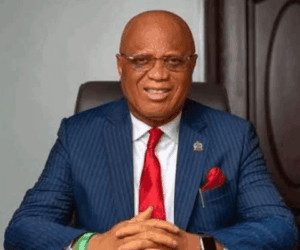According to Touray, the refinery, which produces Euro V standard fuels, is critical to helping the sub-region meet its 50 ppm sulphur limit for petroleum products, a standard many imported fuels fall short of.
“We are still importing products below our standard when a regional company such as Dangote can meet and exceed these requirements. The private sector must take the lead in ECOWAS industrialisation,” he added.
Commending Dangote Group’s investment in industrial development, Touray stressed that closer collaboration between governments and the private sector “is needed” to advance regional growth. He noted that their visit also served as an opportunity to hear directly from Dangote about what the private sector expects from ECOWAS.
The ECOWAS President emphasised that a robust “industrial strategy is essential” to address persistent issues such as poverty, unemployment and insecurity. He pledged the Commission’s support in facilitating market access for the Dangote Group across West Africa and beyond.
Leading the delegation on a guided tour of the facility, President of Dangote Group, Aliko Dangote, restated that the refinery was built with a pan-African vision and has the capacity to supply refined products across the sub-region.
“There have been many claims suggesting that we don’t even produce enough to meet Nigeria’s needs, so how could we possibly supply other West African countries? But now, they are here to see the reality for themselves and, more importantly, to encourage other nations to embark on similar large-scale industrial projects,” Dangote said. He warned that continued dependence on imports was unsustainable for the continent.
“As long as we continue importing what we can produce, we will remain underdeveloped. This refinery is proof that we can build for ourselves at scale, to global standards,” Dangote remarked.
Highlighting the economic benefits of domestic refining, Dangote noted the significant drop in diesel prices when the refinery began production last year.”
“Guardian” newspaper of June 2, 2025. Front page headline: SERAP SUES NNPCL OVER ALLEGED MISSING N500B” (by Oludare Richards).
“SOCIO-ECONOMIC Rights and Accountability Project (SERAP) has sued Nigerian National Petroleum Company Limited (NNPCL) over alleged failure to account for and explain missing N500 billion, which it failed to remit to the Federation Account between October and December 2024.
The suit followed recent allegations by the World Bank that out of the N1.1 trillion revenue from crude sales and other income in 2024, the NNPCL only remitted N600 billion, leaving a deficit of N500 billion unaccounted for.
“Commending Dangote Group’s investment in industrial development, Touray stressed that closer collaboration between governments and the private sector “is needed” to advance regional growth.”
In response to SERAP’s Freedom of Information (FoI) request, the NNPCL had claimed, through its lawyers, Afe Babalola and Co., that the FoI Act did not apply to it.
But in the suit number FHC/L/MSC/553/2025 filed at the weekend at the Federal High Court in Lagos, SERAP is seeking an order of mandamus to direct and compel the NNPCL to account for the alleged missing N500 billion, which it allegedly failed to remit to the Federation Account between October 2024 and December 2024.
SERAP is also asking the court to direct and compel the NNPCL to invite appropriate anti-corruption agencies to investigate the spending and whereabouts of the said N500 billion and to ensure the prompt recovery and remittance of the money to the Federation Account.
In addition, the organisation is asking the court to direct and compel the NNPCL to identify those suspected to be responsible for the alleged missing oil funds, surcharge them for the full amount involved, and hand them over to appropriate anti-corruption agencies for investigation and prosecution.
In the suit, SERAP is arguing that the NNPCL has a responsibility to comply with the Nigerian Constitution 1999 (as amended), the Freedom of Information Act, and the country’s international human rights and anti-corruption obligations in the exercise of its statutory functions.”
The organisation is also arguing that “the missing oil revenues have further damaged the already precarious economy in the country and contributed to high levels of deficit spending by the government and the country’s crippling debt crisis.”
It is further holding that, “The missing oil revenue reflects a failure of NNPCL accountability more generally and is directly linked to the institution’s continuing failure to uphold the principles of transparency and accountability.”
SERAP is also arguing that “The Supreme Court in a groundbreaking judgement recently declared that the Freedom of Information Act ‘is applicable and applies to the public records in the Federation’, including those kept by the NNPCL.”
The suit filed on behalf of SERAP by its lawyers, Kolawole Oluwadare, Ms Oluwakemi Oni, and Ms Valentina Adegoke, read in part: “Nigerians continue to bear the brunt of these missing public funds from the NNPCL meant for the economic development of the country.”
“There is a legitimate public interest in providing the details sought. The NNPC has a legal responsibility to account for and explain the whereabouts of the missing oil money.
The country’s oil wealth ought to be used solely for the benefit of the Nigerian people and for the sake of the present and future generations.









